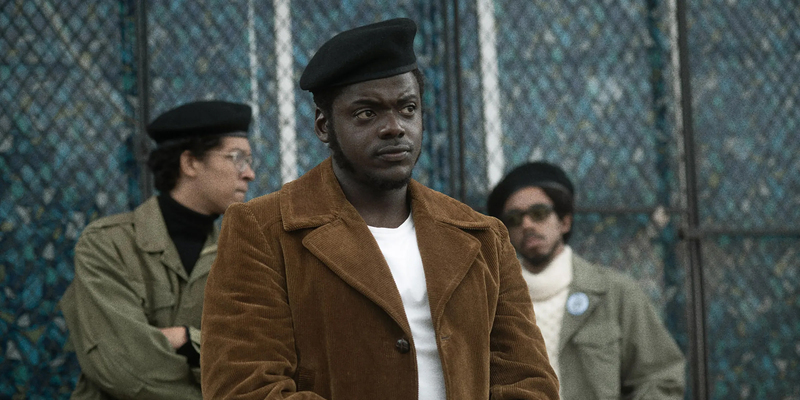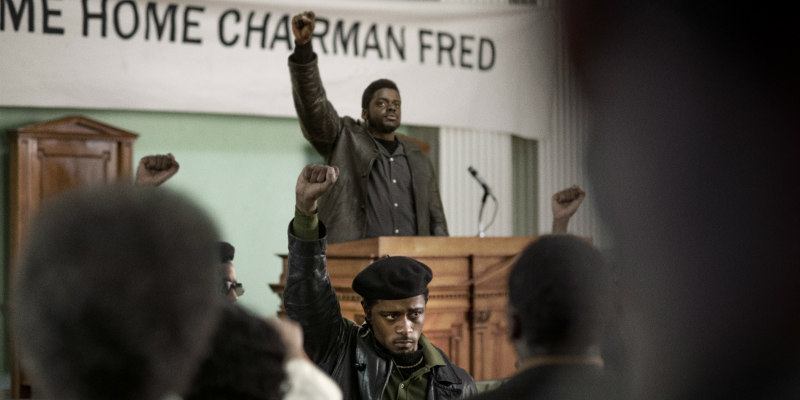
Review by
Eric Hillis
Directed by: Shaka King
Starring: Daniel Kaluuya, LaKeith Stanfield, Jesse Plemons, Dominique Fishback,
Ashton Sanders, Martin Sheen

Like
The Assassination of Jesse James by the Coward Robert Ford, director Shaka King's
Judas and the Black Messiah tells the story of the murder
of an iconic American figure largely through the lens of the man
responsible for his demise.
The Judas of the title is William "Bill" O'Neal (LaKeith Stanfield), a teenage car thief who in 1968, agrees to become an FBI informant
in order to avoid an 18 month prison sentence. Under the thumb of agent
Roy Mitchell (Jesse Plemons), O'Neal is tasked with infiltrating
the Illinois headquarters of the Black Panther Party, specifically to
provide evidence to put its charismatic young figurehead, Fred Hampton
(Daniel Kaluuya), behind bars.

History is messy, and reality rarely conforms to three act structures,
but King and co-screenwriter Will Berson structure their
film using the template of a conventional undercover thriller ala
Donnie Brasco and The Departed. The problem with this approach is that Hampton is no mob boss, but
rather a committed political activist who just wants to do right by his
people. By any metric we should be on Hampton's side, but using the
thriller template means that we invariably find ourselves sweating along
with the man who will ultimately betray him. The film frequently stages
its suspense sequences in a manner that preys on our apprehension of
O'Neal getting rumbled rather than our fear of Hampton getting
executed.
The character of O'Neal doesn't slot comfortably into such mainstream,
formulaic storytelling. He's the nominal antagonist here, but it's
difficult to view O'Neal, who was a mere 17(!!!) when he started working
for the Feds, as a cut and dry villain. Yes, he took the cowardly and
dishonorable way out to avoid prison, but you have to remember that at
the same time thousands of young American men were faced with a similar
choice of going to prison or agreeing to kill rice farmers on the other
side of the world. In reality O'Neal never admitted to any guilt over
his role in the death of Hampton, but the fact that he took his life
mere hours after the 1989 premiere of a TV documentary on his actions
suggests that he had indeed been haunted by his past.
Judas and the Black Messiah never takes a stand on whether
to portray O'Neal as an opportunist who would gladly sell out his people
for a few dollars or a young man manipulated into a Sophie's choice by
forces he can't stand up to.

Similarly, we never really get a handle on who Hampton was and why he
was so revered. Reduced to a supporting player, Hampton is most often
seen orating rousing speeches, and while Kaluuya is as towering in the
role as it's possible for a 5'8" actor to be, we never see what those
speeches lead to, what effect Hampton's leadership has in his community.
Once again we have a mainstream American movie that doesn't understand
the golden rule of "show, don’t tell." We hear a lot about how great
Hampton is, and conversely the FBI talk a lot about what a threat he
poses, but we're rarely given any visual evidence to back this up.
The most difficult aspect of
Judas and the Black Messiah to swallow is the relationship
between O'Neal and Mitchell. The FBI man becomes something of a paternal
figure to O'Neal, even going so far as to invite him to his house and to
join him for meals in fancy restaurants. Pull the other one. Are we
supposed to believe that in the late 1960s a white FBI agent would
invite an African-American criminal to his home, let alone be seen
dining with him in restaurants? Would O'Neal even be allowed entry to
such establishments? Maybe I'm being too cynical, but this seems wildly
anachronistic, and I didn't buy a minute of the interactions between
O'Neal and his handler.

While Kaluuya and Stanfield are excellent here, the casting of two
actors who are both a decade older than the youngsters they're playing
heavily dilutes the drama. Kaluuya is 10 years older than Hampton was
when he was killed, while it's impossible to buy Stanfield as a
17-year-old. You might argue that people aged a lot more rapidly back
then, particularly if they had the tough upbringings of Hampton and
O'Neal, but even so, not casting visibly young actors really feels like
the film is shooting itself in the foot. If Hampton were played by a
21-year-old it would reinforce just what a dynamic figure he was, while
if O'Neal were essayed by an actual teenager we'd view his actions in a
very different light.
With so many issues, most of them oddly self-inflicted,
Judas and the Black Messiah works neither as a historical
biopic nor a thriller. It doesn't have the character depth to function
as the former, and it fails as the latter because the people involved
don't slot into conventional protagonist and antagonist roles. Like so
many movies based on true stories, we learn more about the story and the
people involved from the snippets of information given in the closing
credits, and ultimately Judas and the Black Messiah is yet
another two-hour prompt to visit a Wikipedia entry.

